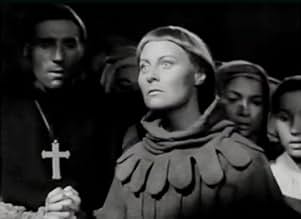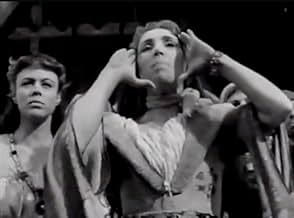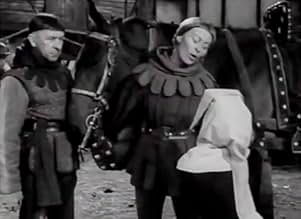Three stories, following three very different women from history: Lysistrata, a dancer from ancient times; Joan of Arc, medieval warrior; and Elisabeth, an American war widow who goes on a p... Read allThree stories, following three very different women from history: Lysistrata, a dancer from ancient times; Joan of Arc, medieval warrior; and Elisabeth, an American war widow who goes on a pilgrimage to Italy.Three stories, following three very different women from history: Lysistrata, a dancer from ancient times; Joan of Arc, medieval warrior; and Elisabeth, an American war widow who goes on a pilgrimage to Italy.
Storyline
Featured review
The best films of the type known as 'Portmanteau' are generally more effective when there is one director at the helm. To have in this case not one but three might very well be an interesting gimmick but the differing styles of each segment can prove frustrating.
The first and indisputably the most effective of the three episodes concerns Elisabeth, an American war widow who has come to visit her husband's grave in Italy and is shown hospitality by a local farm-girl, Angela. One senses pretty quickly that the girl's relationship with the wounded soldier was far from platonic and when a little boy named Anthony appears on the scene plenty of soul-searching ensues...... This is directed by Marcello Pagliero, probably best known to non-Europeans as being on the receiving end of a blow-torch in 'Rome, open City.' Unsurprisingly this has a neo-realist feel with oodles of chiaroscuro, threatening skies and a powerful score by Roman Vlad. Both Claudette Colbert and Eleonora Rossi Drago are simply splendid as Elisabeth and Angela and despite the hit-and-miss nature of Italian post-synchronisation Miss Colbert is well dubbed. This touching piece is well-rounded and complete in itself.
There could not be a greater contrast in episode two as we find ourselves in France of the Middle Ages and are given a brief portrait of the ill-fated Jeanne d'Arc. Although it is studio bound director Jean Delannoy typically evokes a real sense of 'being there' and the unutterable grimness of life in those times is all too apparent from the outset. In terms of her comparative maturity Michele Morgan is of course totally miscast as Jeanne but her charisma and professionalism carry her through whilst looking great in a medieval outfit designed by Christian Dior! She is ably supported by Daniel Ivernel, Robert Dalban and the wondrous but short-lived Andrée Clément. The eagle-eyed might spot a youthful Michel Piccoli. Delannoy emphasises here Jeanne's spirtuality and this director's firmly held religious beliefs were to be fully realised in his later films on Bernadette and Mary of Nazareth.
Unlike the previous segment this one felt strangely incomplete and left this viewer wanting more.
In the last and decidedly least of the trio we are transported to ancient Greece and the legendary tale of Lysistrata and her fellow wives who go on strike sexually until their husbands cease going to war. Whatever his merits as a director, this sort of material is simply not Christian-Jaque's tasse de thé whilst Henri Jeanson's dialogue lacks its customary bite. This plea for pacifism in a broad comedic style on the part of director and writer is totally misjudged. Raf Vallone is wasted as a Neanderthal nitwit and scrumptious Martine Carol is, well...scrumptious.
Neither complete nor incomplete this segment's end came as a relief.
Aristophanes' original from 411 BC is infinitely more amusing.
As 'Portmanteaus' go I suppose 2/3 isn't at all bad!
The first and indisputably the most effective of the three episodes concerns Elisabeth, an American war widow who has come to visit her husband's grave in Italy and is shown hospitality by a local farm-girl, Angela. One senses pretty quickly that the girl's relationship with the wounded soldier was far from platonic and when a little boy named Anthony appears on the scene plenty of soul-searching ensues...... This is directed by Marcello Pagliero, probably best known to non-Europeans as being on the receiving end of a blow-torch in 'Rome, open City.' Unsurprisingly this has a neo-realist feel with oodles of chiaroscuro, threatening skies and a powerful score by Roman Vlad. Both Claudette Colbert and Eleonora Rossi Drago are simply splendid as Elisabeth and Angela and despite the hit-and-miss nature of Italian post-synchronisation Miss Colbert is well dubbed. This touching piece is well-rounded and complete in itself.
There could not be a greater contrast in episode two as we find ourselves in France of the Middle Ages and are given a brief portrait of the ill-fated Jeanne d'Arc. Although it is studio bound director Jean Delannoy typically evokes a real sense of 'being there' and the unutterable grimness of life in those times is all too apparent from the outset. In terms of her comparative maturity Michele Morgan is of course totally miscast as Jeanne but her charisma and professionalism carry her through whilst looking great in a medieval outfit designed by Christian Dior! She is ably supported by Daniel Ivernel, Robert Dalban and the wondrous but short-lived Andrée Clément. The eagle-eyed might spot a youthful Michel Piccoli. Delannoy emphasises here Jeanne's spirtuality and this director's firmly held religious beliefs were to be fully realised in his later films on Bernadette and Mary of Nazareth.
Unlike the previous segment this one felt strangely incomplete and left this viewer wanting more.
In the last and decidedly least of the trio we are transported to ancient Greece and the legendary tale of Lysistrata and her fellow wives who go on strike sexually until their husbands cease going to war. Whatever his merits as a director, this sort of material is simply not Christian-Jaque's tasse de thé whilst Henri Jeanson's dialogue lacks its customary bite. This plea for pacifism in a broad comedic style on the part of director and writer is totally misjudged. Raf Vallone is wasted as a Neanderthal nitwit and scrumptious Martine Carol is, well...scrumptious.
Neither complete nor incomplete this segment's end came as a relief.
Aristophanes' original from 411 BC is infinitely more amusing.
As 'Portmanteaus' go I suppose 2/3 isn't at all bad!
- brogmiller
- Jul 15, 2021
- Permalink
Details
- Release date
- Countries of origin
- Languages
- Also known as
- Daughters of Destiny
- Production companies
- See more company credits at IMDbPro
- Runtime1 hour 54 minutes
- Color
Contribute to this page
Suggest an edit or add missing content

































